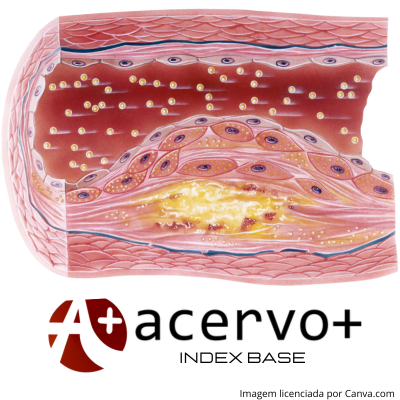Terapias anti-inflamatórias emergentes para aterosclerose
##plugins.themes.bootstrap3.article.main##
Resumo
Objetivo: Avaliar a eficácia das terapias anti-inflamatórias emergentes, como os inibidores de interleucina, na redução da progressão da aterosclerose e na prevenção de eventos cardiovasculares em pacientes com aterosclerose. Métodos: Revisão integrativa através da plataforma de base de dados Pubmed. A pesquisa foi feita através da estratégia de pesquisa: (("Anti-Inflammatory Agents"[MeSH]) OR ("Interleukin Inhibitors"[MeSH])) AND (Atherosclerosis). Foram encontrados um total de 664 artigos na base de dados após a aplicação das estratégias de pesquisa. Após a aplicação dos critérios de inclusão e exclusão, foram selecionados 60 artigos, sendo removidos 41 artigos após a análise inicial. Isso totalizou 19 artigos para análise completa. Resultados: Evidencia-se que as terapias anti-inflamatórias possuem potencial para melhorar o prognóstico de pacientes portadores de aterosclerose, porém ainda existem questões como efeitos colaterais, custo das medicações e eficácia no longo prazo. Considerações Finais: Progressos notáveis na compreensão dos mecanismos subjacentes à inflamação na aterosclerose e no desenvolvimento de estratégias terapêuticas direcionadas aos mesmos apresentam potencial considerável na redução da progressão da aterosclerose e na prevenção de eventos cardiovasculares em pacientes com aterosclerose.
##plugins.themes.bootstrap3.article.details##
Copyright © | Todos os direitos reservados.
A revista detém os direitos autorais exclusivos de publicação deste artigo nos termos da lei 9610/98.
Reprodução parcial
É livre o uso de partes do texto, figuras e questionário do artigo, sendo obrigatória a citação dos autores e revista.
Reprodução total
É expressamente proibida, devendo ser autorizada pela revista.
Referências
2. CHAN YH e RAMJI DP. A perspective on targeting inflammation and cytokine actions in atherosclerosis. Future Med Chem, 2020;12(7):613-626.
3. CHEN S, et al. Novel Role for Tranilast in Regulating NLRP3 Ubiquitination, Vascular Inflammation, and Atherosclerosis. J Am Heart Assoc. 2020;9(12):e015513.
4. GAO W, et al. Reductively dissociable biomimetic nanoparticles for control of integrin-coupled inflammatory signaling to retard atherogenesis. Chem Commun (Camb). 2019 Sep 24;55(77):11535-11538.
5. GASPAROTTO FM, et al. Antiatherosclerotic Properties of Echinodorus grandiflorus (Cham. & Schltdl.) Micheli: From Antioxidant and Lipid-Lowering Effects to an Anti-Inflammatory Role. J Med Food, 2019;22(9):919-927.
6. GEORGAKIS MK, et al. Targeting the CCL2-CCR2 axis for atheroprotection. Eur Heart J, 2022;43(19):1799-1808.
7. GLUBA-BRZÓZKA A, et al. Emerging anti-atherosclerotic therapies. International Journal of Molecular Sciences. 2021; 22(22), 12109.
8. GONG C, et al. Parecoxib improves atherosclerotic plaque stability by suppressing inflammation and inhibiting matrix metalloproteinases production. Biomedicine & Pharmacotherapy, 2021; 138: 111423.
9. HERVÁS SM e NAVARRO HG. Anti-inflammatory Therapies for Cardiovascular Disease: Signaling Pathways and Mechanisms. Revista Española de Cardiologia, 2019; 72: 767-773.
10. JEON S, et al. Anti-Inflammatory Actions of Soluble Ninjurin-1 Ameliorate Atherosclerosis. Circulation, 2020; 142(18):1736-1751.
11. KHAMBHATI J, et al. Immunotherapy for the prevention of atherosclerotic cardiovascular disease: Promise and possibilities. Atherosclerosis. 2018 Sep;276:1-9.
12. KOTTOOR SJ e ARORA RR. The utility of anti-inflammatory agents in cardiovascular disease: a novel perspective on the treatment of atherosclerosis. Journal of cardiovascular pharmacology and therapeutics, 2018; 23(6), 483-493.
13. KOUSHKI K, et al. Anti-inflammatory Action of Statins in Cardiovascular Disease: the Role of Inflammasome and Toll-Like Receptor Pathways. Clin Rev Allergy Immunol, 2021;60(2):175-199.
14. LIBBY P e EVERETT BM. Novel Antiatherosclerotic Therapies. Arterioscler Thromb Vasc Biol. 2019;39(4):538-545.
15. LIU W, et al. Interleukin-23: A New Atherosclerosis Target. Journal of interferon & cytokine research, 2018; 38(10), 440-444.
16. LUO P, et al. Bazedoxifene exhibits anti-inflammation and anti-atherosclerotic effects via inhibition of IL-6/IL-6R/STAT3 signaling. European Journal of Pharmacology, 2021; 893:173822.
17. MCCURDY S, et al. Potential role of IL-37 in atherosclerosis. Cytokine, 2019;122:154169.
18. MENG Q, et al. Morin hydrate inhibits atherosclerosis and LPS-induced endothelial cells inflammatory responses by modulating the NFκB signaling-mediated autophagy. International Immunopharmacol, 2021; 100:108096.
19. POZNYAK AV, et al. Anti-inflammatory therapy for atherosclerosis: focusing on cytokines. International journal of molecular sciences, 2021; 22(13), 7061.
20. RIDKER PM. From Rescue to Zeus: will interleukin-6 inhibition with ziltivekimab prove effective for cardiovascular event reduction? Published on behalf of the European Society of Cardiology, 2021; 117, e138–e140.
21. SOEHNLEIN O e LIBBY P. Targeting inflammation in atherosclerosis—from experimental insights to the clinic. Nature reviews Drug discovery, 2021; 20(8), 589-610.
22. STERPETTI AV. Inflammatory Cytokines and Atherosclerotic Plaque Progression. Therapeutic Implications. Curr Atheroscler Rep, 2020; 22:75: 1-12
23. WACINSKI P, et al. Anti-Inflammatory Effect of Very High Dose Local Vessel Wall Statin Administration: Poly(L,L-Lactide) Biodegradable Microspheres with Simvastatin for Drug Delivery System (DDS). International Journal of Molecular Sciences, 2021; 22(14), 7486.
24. WANG Y, et al. Targeted therapy of atherosclerosis by a broad-spectrum reactive oxygen species scavenging nanoparticle with intrinsic anti-inflammatory activity. ACS nano, 2018; 12.9 : 8943-8960.
25. YU J, et al. IMM-H007, a novel small molecule inhibitor for atherosclerosis, represses endothelium inflammation by regulating the activity of NF-κB and JNK/AP1 signaling. Toxicol Appl Pharmacol. 2019 Oct 15;381:114732.

